Why Nitrile Exam Gloves Are Essential for Professional Safety
Gloves nitrile exam are synthetic rubber protective barriers made from acrylonitrile and butadiene that provide superior puncture resistance, chemical protection, and latex-free safety for medical, laboratory, and industrial applications.
Key Facts About Nitrile Exam Gloves:
- Material: Synthetic rubber (3-5x more puncture resistant than latex)
- Thickness: Typically 3.5-5.5 mil for optimal protection and dexterity
- Standards: Must meet ASTM D6319 and AQL 1.5 for medical use
- Allergy-Safe: Latex-free and powder-free to prevent reactions
- Applications: Healthcare, mortuary services, food handling, and chemical work
- Shelf Life: Up to 5 years when stored below 38°C
- Cost: $6.25-$28.22 per 100-count box depending on brand and certification
Unlike latex gloves that can cause allergic reactions, or vinyl gloves that offer limited protection, nitrile exam gloves deliver the perfect balance of safety, comfort, and durability. They're tested for use with chemotherapy drugs (ASTM D6978) and provide reliable barrier protection against viruses, bacteria, and hazardous chemicals.
For funeral home directors and mortuary professionals, choosing the right protective equipment isn't just about compliance - it's about protecting your staff and maintaining the dignity of your services. Whether you're handling embalming chemicals, performing prep room procedures, or conducting general facility maintenance, nitrile exam gloves offer the reliable protection your team needs.
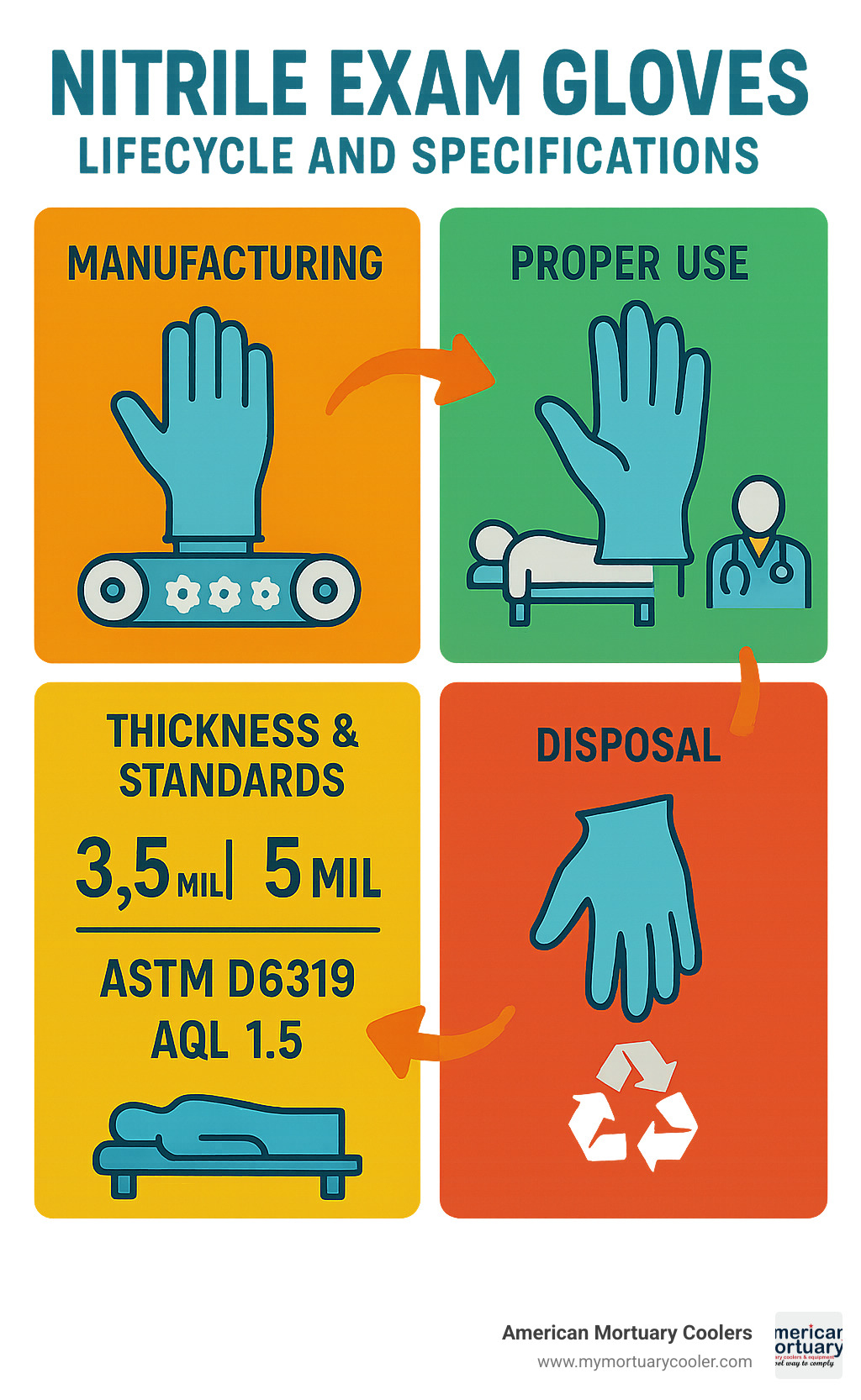
Basic gloves nitrile exam vocab:
What Are Nitrile Exam Gloves?
When you reach for a pair of gloves nitrile exam, you're choosing one of the most advanced protective barriers available today. These synthetic rubber protectors are made from acrylonitrile and butadiene that delivers serious puncture resistance and chemical protection.
Nitrile rubber (also called Buna-N or NBR) excels against oils, fuels, and harsh chemicals while maintaining tactile sensitivity. That's why mortuary professionals, healthcare workers, and lab technicians trust nitrile when precision matters.
Here's what makes nitrile special: it's completely synthetic, which means zero latex protein allergies. No more worrying about staff reactions or stocking multiple glove types. Plus, research consistently shows nitrile gloves are three to five times more puncture resistant than latex. When you're handling sharp instruments or working with hazardous materials, that extra protection is essential.
Composition & Manufacturing Basics
The magic happens during polymerization, where acrylonitrile and butadiene monomers create nitrile rubber. Manufacturers can adjust the acrylonitrile content - higher percentages boost chemical resistance, while lower amounts keep gloves flexible and comfortable.
Today's gloves nitrile exam are powder-free and accelerator-free by design. The old powdered gloves caused respiratory issues, wound healing interference, and contamination concerns. Modern manufacturing eliminates these problems while maintaining barrier protection.
Quality control ensures reliability. Every batch gets tested for barrier integrity with an Acceptable Quality Level (AQL) of 1.5. This means fewer than 1.5% of gloves can have pinholes or defects - ensuring reliable protection when it matters most.
Gloves Nitrile Exam vs. Latex & Vinyl
Choosing the right glove material is straightforward once you understand the differences. Nitrile eliminates latex allergy risks completely while offering three to five times better puncture resistance. Yes, latex gives slightly better tactile sensitivity, but nitrile's superior chemical resistance and durability usually win.
Vinyl gloves occupy the budget end but offer minimal barrier protection and poor puncture resistance. For funeral homes handling embalming chemicals or performing prep room procedures, vinyl simply doesn't provide adequate safety margins.
| Property | Nitrile | Latex | Vinyl |
|---|---|---|---|
| Puncture Resistance | Excellent | Good | Poor |
| Chemical Resistance | Excellent | Fair | Poor |
| Allergy Risk | None | High | Low |
| Tactile Sensitivity | Good | Excellent | Fair |
| Cost | Moderate | Low | Lowest |
| Durability | Excellent | Good | Poor |
The bottom line? Nitrile exam gloves deliver the best balance of protection, comfort, and safety for professional environments. When you're protecting both your staff and your clients' families, that peace of mind is worth every penny.
Key Features, Standards & Certifications
When choosing gloves nitrile exam for your facility, understanding standards and certifications ensures your staff has reliable protection when they need it most.
The gold standard for medical-grade nitrile exam gloves is ASTM D6319, which sets comprehensive specifications covering everything from tensile strength to barrier integrity.
AQL 1.5 (Acceptable Quality Level) means that out of every 100 gloves, no more than 1.5 can have defects like pinholes. That's the reliability you need when handling potentially hazardous materials in mortuary work.
Other key certifications include FDA 510(k) clearance for medical use, Health Canada MDL, and EN 455 for European standards. For food service applications, look for FDA 21 CFR 177.2600 approval.
Quality nitrile exam gloves feature beaded cuffs that prevent roll-down and textured fingertips for extra grip whether hands are wet or dry - crucial when handling instruments or working with embalming fluids.
Barrier & Chemical Protection Explained
Gloves nitrile exam are tested for viral penetration resistance using ASTM F1671, ensuring viruses can't penetrate the material.
For chemical protection, many nitrile exam gloves are chemo-rated according to ASTM D6978, tested against chemotherapy drugs and other hazardous chemicals. If you're working in a mortuary environment with formaldehyde and other embalming chemicals, this protection is essential.
Barrier effectiveness depends on thickness (measured in mils), material formulation (higher acrylonitrile content means better chemical resistance), and manufacturing quality (proper curing prevents weak spots).
Check out this Technical Sheet Medsup Nitrile Gloves for detailed barrier properties and test results.
Sizes, Colors & Specialty Options
Getting the right fit is about safety. Gloves nitrile exam come in sizes from XS to 2XL. Too loose and they slip off; too tight and they tear when needed most.
Thickness matters. Standard 3.5 mil gloves work for routine tasks, but step up to 4.5-5.0 mil for higher-risk work. For serious chemicals, 5.5-6 mil gloves provide maximum protection.
Color serves safety functions. Blue provides visual contrast to spot contamination. Black gloves hide blood stains, reducing family anxiety during viewings. Purple gloves give instant visual confirmation of proper protection. Orange offers high visibility.
Specialty options include chemo-rated gloves for hazardous drugs, extended cuff versions reaching 12 inches, and high-grip textured surfaces for better instrument control.
Price Drivers & Buying Formats
Gloves nitrile exam range from $6.25 to $28.22 per 100-count box. Brand reputation drives price differences, but you're paying for consistent quality control and reliable supply chains. Thickness and specialty features like chemo-rating increase costs.
Bulk buying makes sense for most facilities. Cases of 1,000 or 2,000 gloves offer significant savings with adequate storage space.
Consider total cost. Higher-quality gloves tear less often, meaning less waste and fewer exposure incidents. Sometimes spending more upfront saves money and headaches long-term.
Uses & Applications of Gloves Nitrile Exam
Gloves nitrile exam have become the go-to protective barrier across countless industries. Their unique combination of durability, chemical resistance, and comfort makes them incredibly versatile for both high-risk medical procedures and everyday tasks.
The beauty of nitrile gloves lies in their reliability. Whether you're a funeral director handling embalming chemicals, a nurse drawing blood, or a chef preparing food, you need protection you can count on. That's exactly what nitrile delivers - consistent barrier protection without latex allergies or vinyl's limited durability.
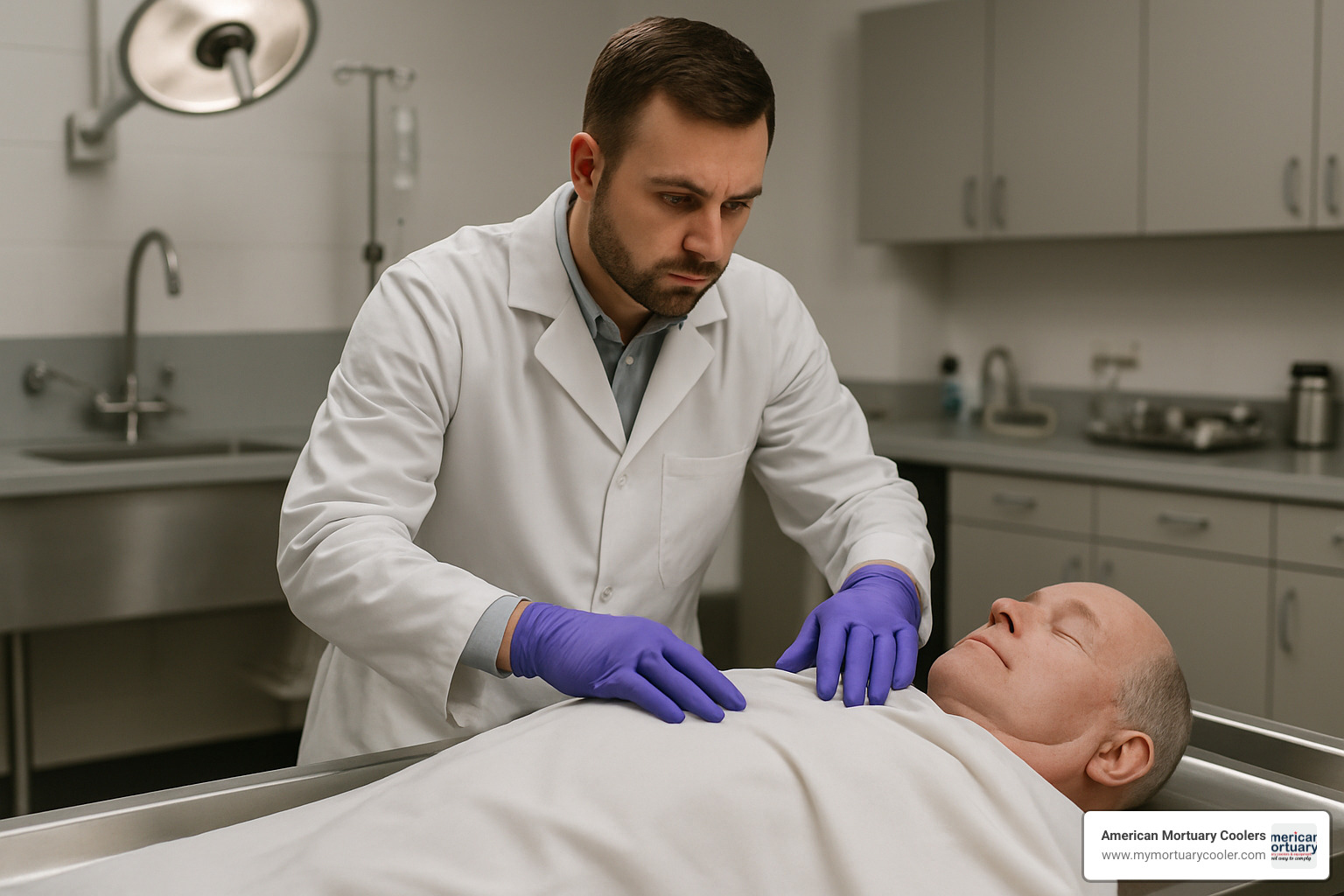
In mortuary settings, gloves nitrile exam serve as the first line of defense against biological hazards and harsh chemicals. Funeral professionals face unique challenges - from handling bodies with unknown infectious diseases to working with formaldehyde and other embalming fluids. The superior puncture resistance and chemical barrier properties of nitrile make it the smart choice for maintaining safety while preserving funeral service dignity.
Medical & Laboratory Settings
Healthcare workers have acceptd nitrile exam gloves as their preferred protective equipment. During routine patient examinations, these gloves provide the tactile sensitivity doctors need while creating a reliable barrier against bloodborne pathogens.
Phlebotomy technicians particularly appreciate nitrile's puncture resistance when working with needles and blood collection equipment. The improved grip texture helps maintain control of instruments, even when hands become moist during long procedures.
For chemotherapy handling, specialized chemo-rated nitrile gloves tested to ASTM D6978 standards are essential. These gloves undergo rigorous testing against more than 60 different chemotherapy drugs, giving oncology nurses and pharmacists confidence in their protection.
Laboratory workers face unique challenges with specimen handling and chemical exposure. Nitrile's excellent chemical resistance protects against acids, solvents, and biological materials that would quickly degrade latex or vinyl gloves.
For comprehensive guidance on protective equipment needs, check out our detailed resource on prep room supplies that covers essential safety equipment for mortuary professionals.
Industrial, Food & Service Industries
Beyond healthcare, gloves nitrile exam have found their place in industries where chemical resistance and durability matter most. The food service industry relies heavily on nitrile gloves because they meet FDA 21 CFR 177.2600 requirements for direct food contact while preventing cross-contamination.
Commercial kitchens present unique challenges with hot oils, acidic ingredients, and strong cleaning chemicals. Nitrile gloves handle these conditions beautifully, maintaining integrity even when exposed to sanitizers and degreasers.
Automotive and industrial workers have found that nitrile's excellent oil and fuel resistance makes it perfect for mechanical work. The gloves maintain flexibility and grip even when exposed to petroleum products, solvents, and hydraulic fluids.
The personal service industries have acceptd nitrile for different reasons. Hair stylists appreciate protection against harsh dyes and chemical treatments, while tattoo artists rely on superior barrier protection against bloodborne pathogens.
What makes nitrile truly special is its versatility - one glove type that can handle such a wide range of applications while maintaining consistent protection and comfort.
Proper Use, Storage & Environmental Considerations
Getting the most out of your gloves nitrile exam means understanding how to use them correctly and store them properly. It's not just about putting them on and taking them off - there's a science to maintaining their protective barrier and keeping your team safe.
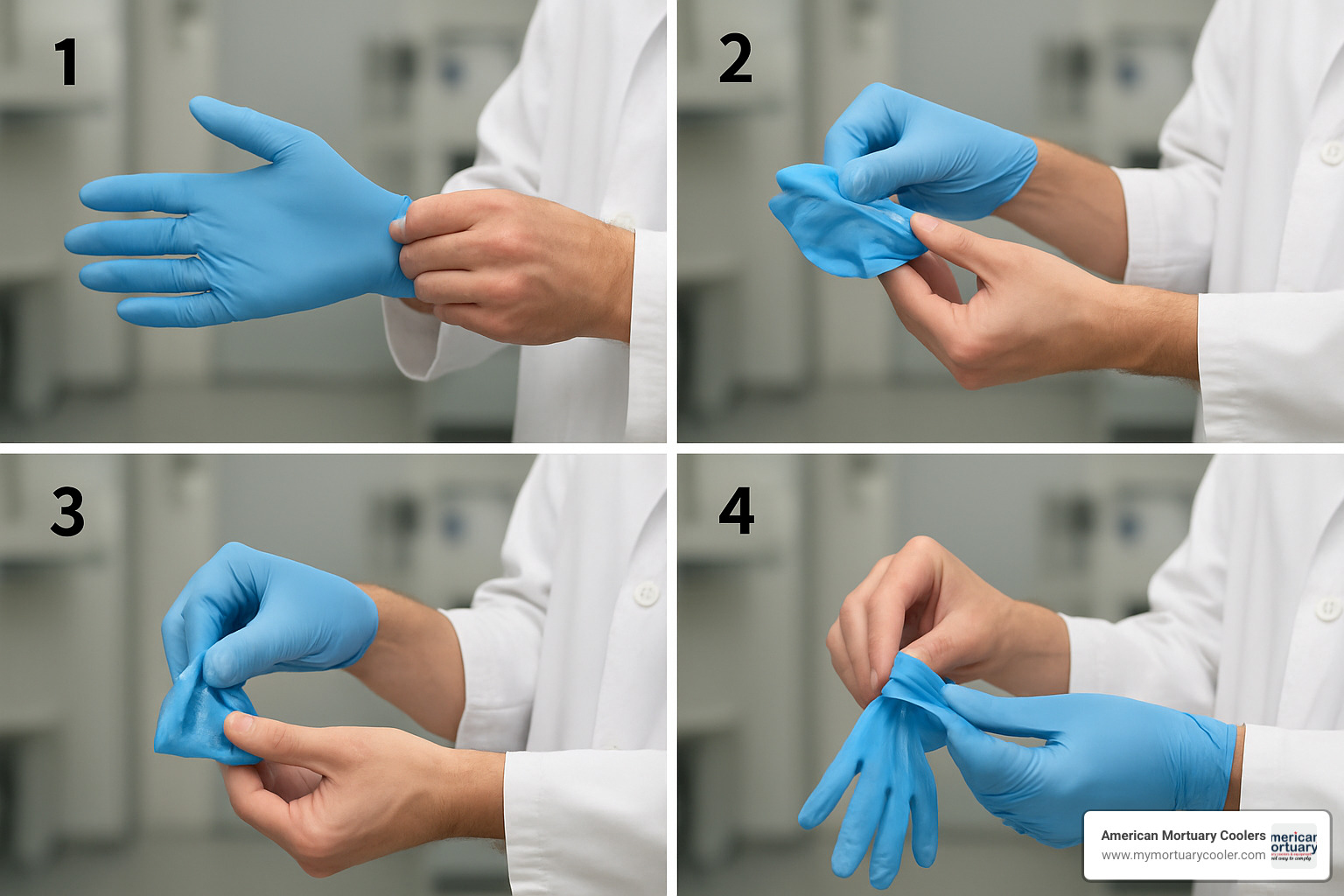
The biggest mistake I see in funeral homes is improper glove removal. You can wear the best nitrile exam gloves money can buy, but if you contaminate yourself taking them off, you've defeated the whole purpose.
Donning & Doffing Best Practices
Always wash your hands thoroughly before gloving up. Clean hands going into gloves prevent contamination from the inside out.
When selecting gloves, choose a size that feels snug but not tight. Loose gloves slip off during procedures, while overly tight gloves tear easily and cause hand fatigue. The glove should cover your wrist completely.
Removing gloves safely is critical. Here's the method: pinch the outside of one glove near your wrist and peel it away from your body, turning it inside out. Hold that dirty glove in your still-gloved hand, then slide clean fingers under the cuff of the remaining glove. Peel it off while turning it inside out, trapping the first glove inside.
The key is never touching the contaminated outside surface with bare skin. Never reuse disposable nitrile exam gloves. Single-use means single-use, period. The barrier integrity gets compromised the moment you remove them.
Storage, Shelf Life & Quality Checks
Your nitrile gloves can turn into expensive garbage if stored improperly. Heat is the enemy - keep them below 38°C (100°F) in a cool, dry place. That means no storing boxes on water heaters or in direct sunlight.
UV light breaks down nitrile rubber over time, making gloves brittle. Keep them in original boxes until ready to use. The cardboard isn't just packaging - it's protection.
Unopened boxes last up to 5 years from manufacture date, but once opened, use gloves within 6-12 months for best quality. Set up a first-in, first-out rotation system. Write the date you opened each box on the cardboard.
Before using any glove, give it a quick visual inspection. Look for pinholes, tears, or thin spots that could compromise protection. If a glove looks discolored or feels brittle, toss it.
Allergy & Eco Footprint
While gloves nitrile exam eliminate latex allergy problems, they're not completely allergy-free. Some people develop Type IV hypersensitivity reactions to chemical accelerators. If someone develops skin irritation, look for accelerator-free formulations.
The environmental reality is that nitrile gloves aren't biodegradable. Every pair sits in landfills essentially forever. However, some manufacturers now offer recycling programs like RightCycle™ that convert used gloves into plastic lumber.
Consider environmental impact by choosing the right glove for each task. Proper sizing also reduces waste - gloves that fit correctly tear less often, meaning fewer pairs end up in trash.
Leading Brands, Cost Snapshot & How to Choose
The world of gloves nitrile exam can feel overwhelming with so many brands and options available. But once you understand what to look for, choosing the right gloves becomes much simpler.
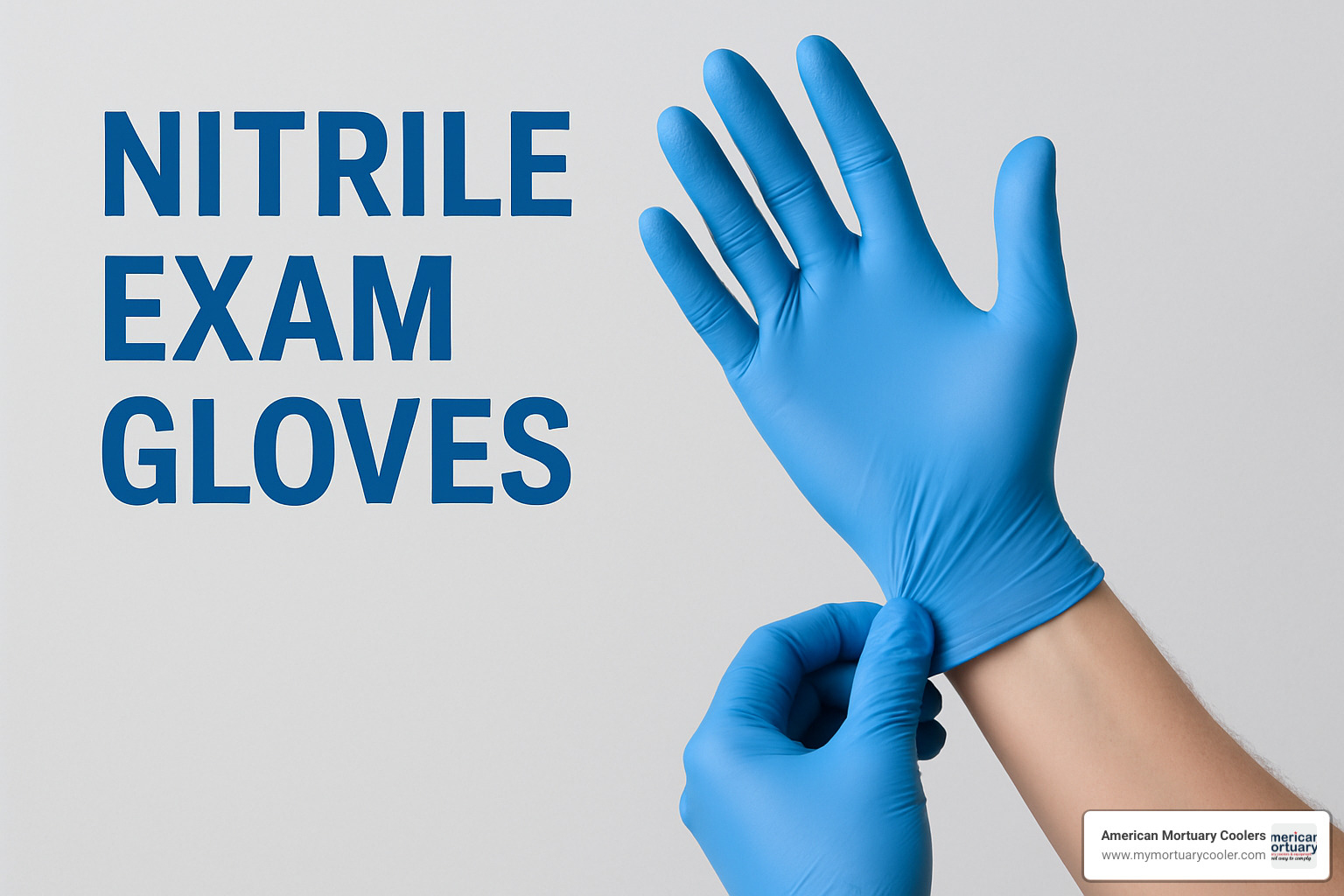
Kimtech Purple Nitrile gloves are the premium choice - that distinctive purple color is instant visual confirmation of proper protection. They cost more, but many funeral directors swear by them for reliability and comfort during long procedures.
Fisherbrand offers solid performance with proper ASTM compliance at reasonable prices. McKesson provides cost-effective options that still meet safety standards.
For chemotherapy drugs or embalming chemicals, Intco AdvanCare offers chemo-rated protection in convenient 200-count boxes. NSI FlexShield comes in black, which many mortuary professionals prefer because it hides blood stains and reduces patient family anxiety.
For budget-conscious facilities, SunnyCare provides basic protection at entry-level prices while meeting essential safety requirements.
Expected pricing per 100-count box: budget options run $6.25-$10.00, mid-range brands cost $10.00-$18.00, and premium or specialty gloves reach $18.00-$28.22. Chemo-rated gloves typically cost 20-30% more than standard exam gloves.
Selection Checklist for Your Facility
Choosing the right gloves nitrile exam doesn't have to be complicated. Start with your risk assessment. What will your staff encounter daily? If you're handling embalming chemicals or hazardous substances, chemo-rated gloves are essential.
Comfort and fit make a huge difference in staff satisfaction and safety. Gloves that are too loose slip off at the worst moments, while too tight gloves tear easily and cause hand fatigue. Stock multiple sizes and consider whether your team prefers textured fingertips or smooth surfaces.
Don't overlook regulatory requirements. Ensure chosen gloves meet ASTM standards, FDA requirements, and industry-specific certifications. If you handle food items during memorial services, you'll need food-contact approval too.
Budget considerations go beyond sticker price. Higher-quality gloves might cost more upfront, but they often provide better value through reduced waste, fewer exposure incidents, and improved staff productivity.
Supplier reliability becomes critical when you need gloves and can't wait. Choose suppliers with proven track records, local distribution support, and consistent quality.
For funeral homes and mortuary facilities, we strongly recommend focusing on chemo-rated gloves. The additional cost is minimal compared to superior protection against embalming chemicals and hazardous substances your staff encounters daily.
Understanding safety protocols extends beyond choosing the right gloves. For comprehensive facility safety information, check out our guide on Essential Safety Protocols for Morgue Freezers.
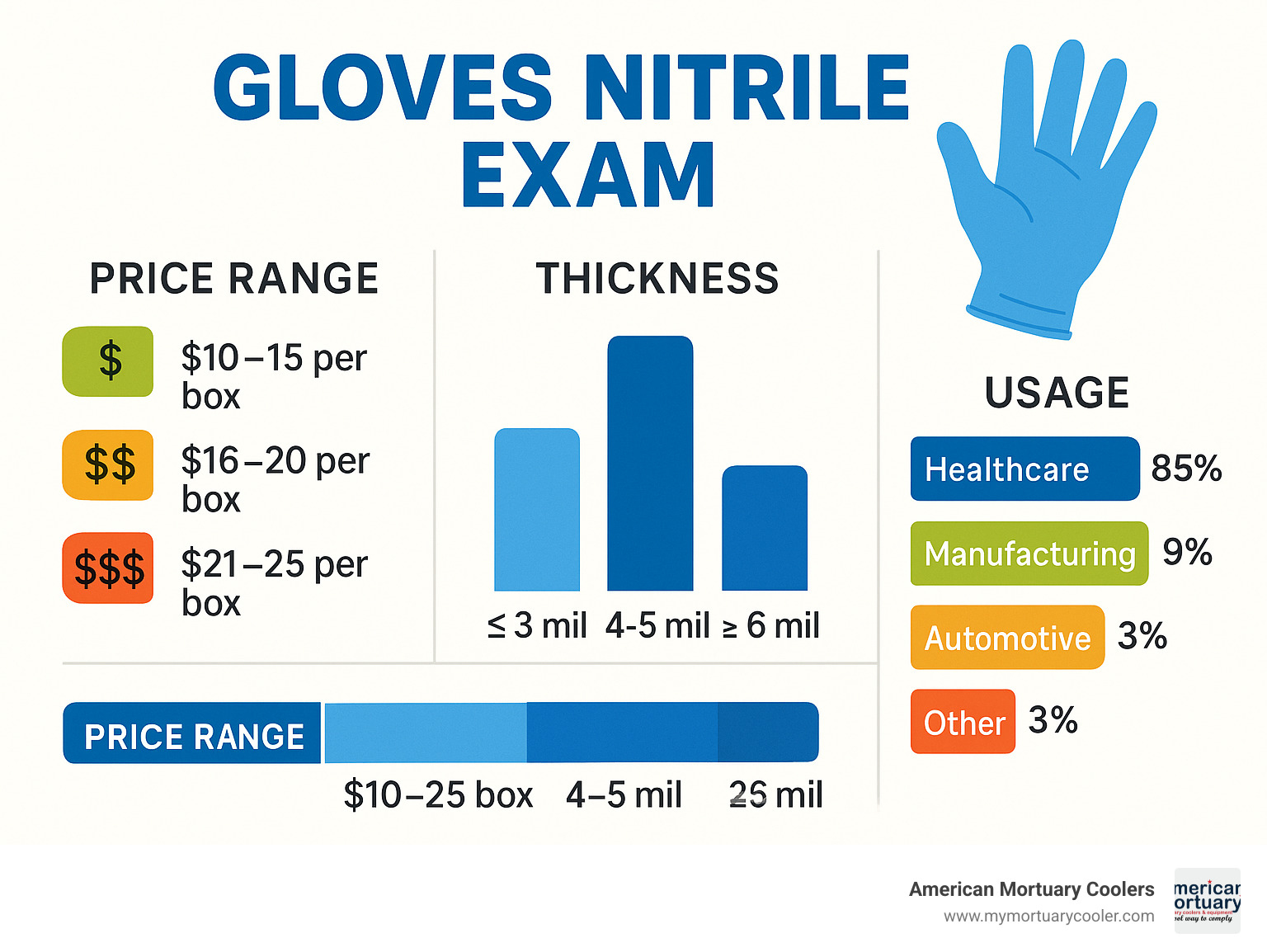
Frequently Asked Questions About Gloves Nitrile Exam
When it comes to gloves nitrile exam, I get questions from funeral directors and healthcare professionals. After years of helping facilities choose the right protective equipment, these are the three questions that come up most often.
How do nitrile exam gloves differ from surgical gloves?
Gloves nitrile exam are designed for routine procedures and general protection, while surgical gloves are built for invasive procedures where sterility is critical. Think of exam gloves as your everyday workhorses - perfect for embalming prep, general facility cleaning, or routine examinations.
The big difference is sterility. Surgical gloves come individually wrapped and sterile, while exam gloves are clean but not sterile. Surgical gloves also meet stricter standards - they follow ASTM D3577 with an AQL of 1.0, while exam gloves meet ASTM D6319 with AQL 1.5.
Surgical gloves cost two to three times more than exam gloves. For most mortuary work, exam gloves provide excellent protection without the premium price. Save surgical gloves for actual surgical procedures and use quality exam gloves for everything else.
Can nitrile exam gloves be reused or sanitized safely?
The answer is absolutely not. Gloves nitrile exam are designed as single-use items, and trying to clean or reuse them is dangerous.
When you attempt to sanitize disposable gloves, you're playing Russian roulette with safety. The cleaning process can create microscopic holes that aren't visible. Even worse, sanitizing chemicals can weaken the nitrile material, making it more likely to tear when you need protection most.
Contaminants can get trapped in the textured surface, creating a breeding ground for bacteria. The rule is simple: one task, one pair of gloves. Change gloves between different procedures, between clients, and whenever you suspect contamination.
What does AQL 1.5 actually mean for everyday users?
AQL stands for Acceptable Quality Level. AQL 1.5 means that out of every 100 gloves in a batch, fewer than 2 can have critical defects like pinholes that would let contaminants through. In other words, you're getting a 98.5% reliability rate with your gloves nitrile exam.
Achieving 100% perfection in mass manufacturing would make gloves prohibitively expensive. AQL 1.5 represents the sweet spot between quality and affordability for medical-grade protection.
This quality level has been proven safe for medical and mortuary applications over decades of use. It's why AQL 1.5 is the standard for medical exam gloves worldwide. If you want even higher quality, surgical gloves offer AQL 1.0, but for routine mortuary work, AQL 1.5 provides reliable protection at reasonable cost.
Conclusion
When you're protecting your team and the families you serve, the right gloves nitrile exam make all the difference. These synthetic rubber barriers aren't just another supply item - they're your first line of defense against chemical exposure, infectious agents, and workplace hazards that come with funeral service.
The numbers speak for themselves: nitrile gloves offer 3-5 times better puncture resistance than latex, eliminate allergy risks entirely, and provide superior chemical protection for handling embalming fluids and other hazardous materials. That's peace of mind you can't put a price on.
At American Mortuary Coolers, we've spent years helping funeral homes across the contiguous 48 states build safer, more efficient operations. Just like our custom mortuary coolers are built to last and protect what matters most, quality gloves nitrile exam are an investment in your team's safety and your facility's reputation.
A box of premium nitrile gloves might cost $20-25, but a single exposure incident could cost thousands in medical bills, lost work time, and regulatory issues. The math is simple - quality protection pays for itself.
Whether you're new to funeral service or running a multi-generational family business, the fundamentals remain the same. Certified gloves that meet ASTM standards protect your staff during embalming procedures, preparation work, and facility maintenance. Your team deserves equipment they can trust, and families deserve to know their loved ones are handled with the highest standards of safety and care.
For more guidance on building a comprehensive safety program and finding reliable suppliers, check out our A Comprehensive Guide to Funeral Equipment Suppliers.
The bottom line? Don't compromise on protective equipment. Choose gloves nitrile exam that fit your specific needs, train your staff properly, and maintain the professional standards that set your facility apart. When families trust you with their most difficult moments, every detail - including the gloves your team wears - reflects your commitment to excellence.
Your dedication to safety isn't just good business - it's the right thing to do. And that's what quality funeral service is all about.



















